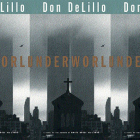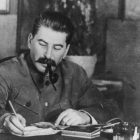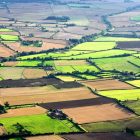Just Suppose: Poetry for Fans of Speculative Fiction
Robert Heinlein, the prolific author of Starship Troopers and other sci-fi works, coined the term “speculative fiction” in 1947. In the essay, Heinlein defines “speculative fiction” as “the story embodying the notion ‘Just suppose—’ or ‘What would happen if—’.” For Heinlein, this narrative hypothesis creates “a new framework for human action.” He takes pains to insist that it is “honest-to-goodness science fiction,” even if it might not seem like it.
Of course, two years after Heinlein’s essay, 1984 was released, and it seems as though speculative fiction—or spec fic for you hepcats—has only grown in popularity since. In all its iterations, from post-apocalyptic to dystopic to alternate history, spec fic is increasingly where writers turn when the world around them seems on a frightening trajectory. Writers take the seeds being planted in the now and imagine the future they might lead to, usually with dire consequences. And 2016, I think we can all agree, has been a spectacularly scary year so far.
As a fiction reader, I devour spec fic. But as a writer and lover of poetry, I started to wonder: was there such a thing as speculative poetry? Did poets ever imagine new frameworks of the future in the way that fiction writers increasingly do in their work?
When I first posed this question, the only thing I could really think of immediately was Robert Frost’s “Fire and Ice,” a maddening little poem in which Frost imagines an apocalypse that will either be fiery or frigid, and then decides he doesn’t really care which, since we’ll all be dead. Frost’s poem stands as an early, if somewhat unsatisfying, progenitor of what I’ll call “apocalypse poetry.” A fantastic anthology, Apocalypse Now: Poems and Prose from the End of Days, captures a wide array of these, from Maggie Smith’s homages to sci-fi movie apocalypses to Simone Muench’s wolf centos with their more symbolic approaches to ideas of danger and annihilation. Lyric poetry is particularly suited to pondering the apocalypse, it seems to me, because the form itself stops time, resting in a particular emotion or interrogation. Many poems that ponder the apocalypse are meditative, largely paused inside the speculative space, and creating a scene the way a sketch would, with a few strokes of image. Technically, these may be “speculative,” but I am not sure they meet Heinlein’s criteria of “a new framework for human action.”
But book-length projects have one important thing in common with speculative fiction: they can world-build. It’s not so much about narrative arc—that doesn’t seem essential. But books of poetry are able, like novels, to construct a world over the course of many poems. Take Kevin Prufer’s 2008 collection National Anthem. Instead of a narrative through-line, the book stitches together, poem by poem, and via repeated images and juxtapositions, an America that takes its place beside other toppled empires. The book begins with the end—the first poem, “Apocalypse,” starts like so many post-apocalyptic novels, with survivors navigating a dying city: “Around that time, the city grew quiet. / You said don’t hurt me and I said if I was going to hurt you I’d have done / it already.” These nameless survivors are threaded throughout the poems: often at night, often in the cold, often with an ominous moon (which “grew like an empire, then fell like a bomb”) shining down on them. Sometimes these figures seem like lovers; at other times, as in “Apocalypse,” they seem like kidnapper and hostage.
If this all sounds a little Night of the Living Dead, that’s because it is, but instead of being pursued by zombies, National Anthem is haunted by the ghosts of dead soldiers and other collapsed civilizations. Like all great spec fic, it takes the world around us and coaxes out its most nightmarish possibilities to create a landscape that is at once familiar and alien.
Perhaps the most adventurous collection of speculative poetry I know is Cathy Park Hong’s Dance Dance Revolution, which was published in 2007 and is set this year, in 2016. As in Prufer’s book, there are two central characters, here given names: the Guide and the Historian. The Guide works as a tour guide in a fictional city called The Desert, and the Historian is a scholar who is interviewing the Guide about her past as a dissident in the 1980 Kwangju Uprising in South Korea. The Historian, too, has a past steeped in violence: she was raised in Sierra Leone, a country that was crushed under the weight of civil war.
Where Prufer’s book takes the suburb as its resonant center, with its big box stores and enforced distances, Hong takes The St. Petersburg Hotel, a resort in the Desert teeming with visitors from all over the world and in the midst of a Vegas-style environment with hula hoopers, wedding chapels, and hawkers at bazaars. This high-speed collision of many cultures is reflected in the collection’s most dazzling aspect: the Guide speaks an essentially invented language. Working in the Desert is a partial explanation for how the Guide has absorbed so many linguistic influences, but in the poem “The Importance of Being English,” we learn another. The poem begins, “Mine gor-belly fadder a mout-rattla but soma-time / he plant poily bromide in me crania: pep gems dat echo.” The father’s lesson hearkens back to a time in Korea when American troops levelled his home, thinking him a Communist spy. The father pleads with the soldiers’ translator, whom he knew in school, and the translator tells the soldiers to move on. The father’s final advice to the young Guide:
You can be the best talker but no point if you can’t
speak the other man’s tongue. You can’t chisel, con, plead,
seduce, beg for your life, you can’t do anything, because you
know not their language. So learn them all.
In Hong’s future, linguistic aptitude is a matter of survival—it is the new framework for human action described by Heinlein. And what better investigation than language for a poet interested in asking what if…?
Artists will never not need speculative works to express their fears about the world around them. It’s high time we started looking at the valuable contributions poetry has made to the genre.



